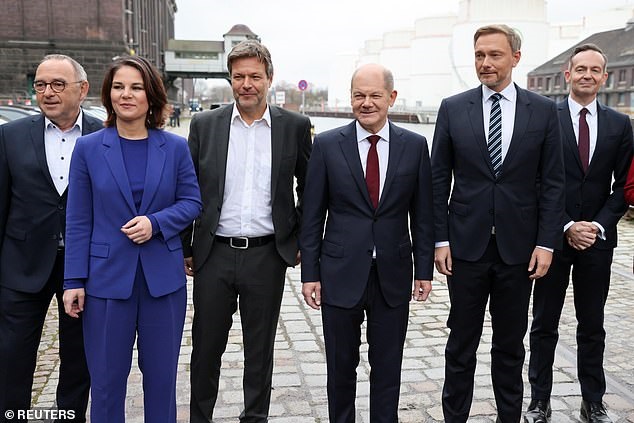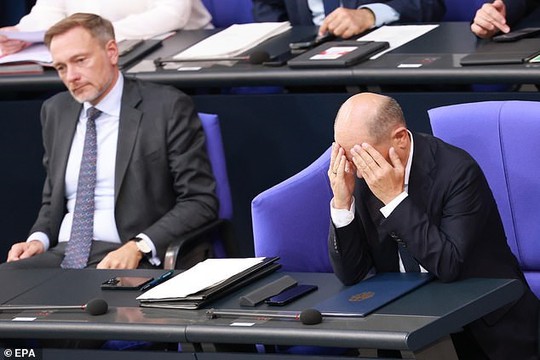Chancellor Scholz with Mr Linder in the German parliament.
After months of disputes, Chancellor Olaf Scholz ousted one of his governing partners finance minister Christian Linder for the breakdown of his centre-left coalition, adding to the challenges for Europe since Donald Trump’s election, writes ‘The New York Times’.
Chancellor Olaf Scholz fired his finance minister on Wednesday, effectively ending his three-party ruling coalition and destabilizing his center-left government just as the election of Donald J. Trump in the United States presented Europe with new economic and security challenges.
“I would have liked to have spared you this difficult decision,” said Mr. Scholz during an impromptu news conference in the chancellery on Wednesday evening after several days of talks aimed at salvaging the coalition. “Especially in times like these, when uncertainty is growing,” he added.
Mr. Scholz vowed to keep governing until the end of the year and then to demand a confidence vote in Parliament in January, a test he may fail. That would open the way for early elections, a rarity in Germany since World War II, possibly in March.
The extraordinary trouble in Berlin leaves the European Union evermore rudderless at a particularly difficult time. France’s government is in a crisis after elections there this year yielded a deadlocked Parliament, and Russia has made important advances on the battlefield in Ukraine and continues to threaten Europe broadly.
Now Europe faces the possibility of a trade war with the United States and a weakening of the NATO alliance — both of which Mr. Trump has threatened — as Germany, its most populous country, becomes mired in political instability as well.
The collapse of the coalition in Germany came after the leaders of the three parties — Mr. Scholz’s Social Democrats, the left-leaning Greens and the pro-business Free Democrats — had mostly stopped talking to each other in recent weeks over widening disputes in negotiations for a new federal budget.
Mr. Scholz told reporters that Mr. Lindner had acted irresponsibly for not being willing to compromise.
The coalition, which has governed Germany since the former chancellor, Angela Merkel, left office in 2021, was an uneasy set of political bedfellows from the start. It was the first three-party coalition since the early 1960s, one of the reasons, many in the government say, for its instability, frequent leaks and paralysis.
The coalition’s collapse is stunning for a country long known for plodding and predictable consensus that avoided the political gyrations of some of its more volatile European partners. It may signal a new era of political instability for Germany, as populist parties on the far right and far left gain more popularity on a fracturing political landscape.
Mr. Scholz and Robert Habeck, Germany’s economy minister and member of the Greens party, had initially tried to hold the coalition together. Calling for “pragmatism” in a post on social media on Monday, Mr. Scholz continued: “Coalition governments can sometimes be challenging. But the government is elected, and there are issues that need to be resolved.”
At the heart of the dispute was a roughly 10 billion euro, or $10.7 billion, hole in the 2025 budget.
“Germany is Europe’s biggest economy and the biggest contributor to the E.U. budget; they need to have certainty,” said Sudha David-Wilp, the Berlin-based regional director of the German Marshall Fund, a think tank. “And a minority government means instability for the country and its partners in Europe,” she added.
The Scholz coalition had billed itself as a restart from the sleepy Merkel years. The partners successfully managed pressing problems early in its term after Russia invaded Ukraine in 2022 and Germany stopped importing Russian gas.
But a ruling by the country’s highest court in 2023 forced the government to make drastic cuts in the budget, leading to strife among the partners over the limit on borrowing that is anchored into the constitution.
The final break comes against the backdrop of a stagnant German economy, which is expected to contract by 0.2 percent in 2024, the second year in a row that Germany has stagnated. The country is the weakest member of the Group of 7 and among nations using the euro currency.
 Mr Scholz and his coalition partners in 2021. He has been the head of a so-called 'traffic light coalition – which include his Social Democratic Party (SPD), the Greens and the liberal Free Democratic Party (FDP).
Mr Scholz and his coalition partners in 2021. He has been the head of a so-called 'traffic light coalition – which include his Social Democratic Party (SPD), the Greens and the liberal Free Democratic Party (FDP).
Germany collapses into chaos as centre-left chancellor's coalition falls apart after he sacks finance minister, stresses ‘The Daily Mail’.
The German government has collapsed after the chancellor sacked his finance minister.
German chancellor Olaf Scholz cited persistent disagreements with finance minister Christian Linder for the breakdown of his centre-left coalition.
Mr Scholz's adminstration has been the head of a so-called 'traffic light coalition - which include his Social Democratic Party (SPD) , the Greens and the liberal Free Democratic Party (FDP) – since 2021.
However, the quarrelsome government has stubbled from disagreement to disagreement ever since then with Mr Linder and Mr Scholz often at loggerheads over how to tackle Germany's economic woes.
Now finally their disagreements have reached a boiling point and after a 'make or break' meeting the coalition has collapsed.
Mr Scholz is expected to cobble-together a minority government with the Greens in order to pass legislation before a parliamentary confidence vote in his government on January 15.
This could pave the way for early elections in Germany which would likely be bruising for the former coalition partners.
Scholz's SPD are currently polling third behind the conservative CDU and the right-wing populist AfD. Meanwhile, the FDP polling at below the five per cent threshold to even enter parliament.
The government crisis comes at a critical juncture for Germany, with a flatlining economy, aging infrastructure and an unprepared military.
A political shake-up could fuel growing frustration with Germany's mainstream parties to the benefit of younger populist movements, including the anti-immigrant AfD.
The coalition has been at odds over how best to rescue Europe's largest economy, which is facing its second year of contraction and a crisis in its economic model after the end of cheap gas from Russia following its 2022 invasion of Ukraine and amid increasing competition from China.
Mr Scholz said he had proposed capping energy costs for companies to bolster Germany's appeal as a place to do business. He wanted a package to help save jobs in the ailing auto industry, as well as increased support for Ukraine.
The FDP had proposed public spending cuts, lower taxes and less regulation as the answer to the malaise. It also wants to slow Germany's shift to a carbon-neutral economy.
Mr Scholz said Mr Lindner was focused on the short-term survival of his own party. 'Especially today, one day after such an important event as the U.S. elections, this kind of selfishness is utterly incomprehensible.'
read more in our Telegram-channel https://t.me/The_International_Affairs

 10:25 08.11.2024 •
10:25 08.11.2024 •























